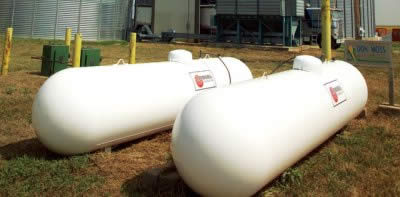Commercial and Industrial Propane Tanks

Propane is widely used as a commercial and industrial fuel for numerous high volume usage activities. These types of large volume applications range from fleet fueling, agricultural heating and commercial kitchen cooking to resale cylinder filling and forklift fueling. There are so many different industrial and commercial uses for propane that choosing a properly sized tank to suit the application requirements can sometimes be complex. Tanks for commercial propane use are generally larger than residential propane tanks.
Tank Sizing for Commercial and Industrial Applications
Commercial and industrial propane tank sizing can be very simple or extremely complex depending on usage requirements and application. There are exponentially more factors that go into selecting an appropriate tank size to meet the needs of propane users in commercial and industrial markets. Luckily, if the application requires more propane, a larger tank or an additional propane tank can be installed to meet the demand requirements. Industrial and commercial propane usage demands can be extremely high in certain situations and when available space for tank installation is limited, propane vaporizers can be incorporated into the industrial LP Gas system.
Common Commercial and Industrial Propane Tanks
Propane in a commercial application generally implies a larger gas usage volume than that of a residential application. As a general rule, commercial and industrial propane users require larger tanks for their needs as they often use propane throughout the year, independent of the weather or cold temperatures. For instance, a residential kitchen may have a load of 65,000 BTU/hr and operate 10 hours a week while a commercial kitchen has a load of 500,000 BTU/hr and run 70 hours a week meaning an exponentially larger propane usage requirement.
Commercial propane applications will almost always require a larger gas tank to meet the demand and although the tanks are used for an industrial purpose, the tanks are still the same as those used in residential service. People often believe that because the propane tank is used in a business, industrial or commercial setting, it is different than that of a residential tank of the same size. This is a common misperception among people and the fact is, a 500 or 1,000 gallon tank in residential service is no different than a 500 or 1,000 gallon tank in commercial or industrial service.
Industrial/Commercial Propane Tank Selection
Choosing a tank size is solely dependent up how much propane you expect to use. This is not a tricky subject in the propane industry but for many people unfamiliar with propane, it can be a bit confusing. It is recommended that you visit with a propane company to determine the best size tank for a commercial propane application. When talking with them, let them know about any future changes that may impact gas usage. This will help in selecting the most appropriate LP Gas tank for the industrial/commercial application. To get an approximate idea of what size tank you may need, add up the total BTU's of LP Gas appliances that will be using propane and divide by 91,500. This will give you a fairly accurate idea of how many gallons of propane will be used in an hour. If the total load is 1,000,000 BTU, the system will use about 11 gallons of propane an hour. It is important to know that this figure represents the BTU load at capacity (100%) so if all appliances are used 10 hours per day at full capacity, the propane consumption will be around 110 gallons per day. Usage such as this would probably require around 2,000 gallons or more in storage.
While commercial and industrial applications may require a year-round supply of propane at a fairly steady rate, any appliances or equipment used during the heating season must be taken into consideration. It would be fairly straight forward to size a large propane tank for use in an industrial setting where LP Gas fired equipment runs at a steady and constant rate. But when the demand for gas increases significantly during cold temperatures and the draw on that same tank is much higher, problems with adequate propane vaporization can arise. This is just one reason that commercial and industrial propane tank sizing is better left to licensed, professional propane companies.
